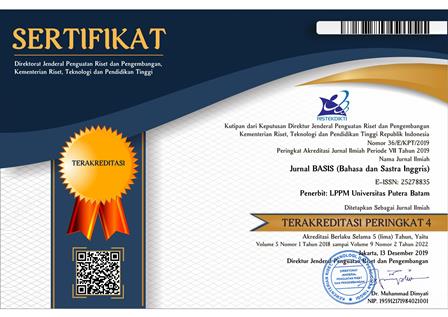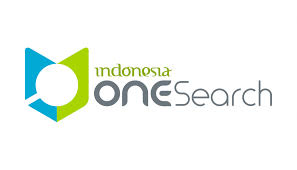NILAI-NILAI BUDAYA MASYARAKAT WAKORUMBA SELATAN DALAM CERITA RAKYAT NGKAA-NGKAASI
DOI:
https://doi.org/10.33884/basisupb.v7i1.1796Kata Kunci:
cultural values, Ngkaa-ngkaasi folklore, South Wakorumba CommunityAbstrak
This paper discussed the cultural values of the South Wakorumba Society in the Ngkaa-ngkaasi folklore. This paper is motivated by the beginning of a reduction in public awareness of the presence of folklore in everyday life. Folklore, which contains a lot of good values, it should stay alive and be preserved in society. On the other hand, the source of the folklore of the elderly people who have mostly died will be increasingly disappeared because these parents may not necessarily pass this story on to their children and grandchildren. So, it is feared that this folklore will become extinct. This paper aimed to describe the cultural values of the South Wakorumba community in the Ngkaa-ngkasi folklore. This paper was analyzed by using qualitative descriptive methods. Data collection techniques used was recording techniques, observation techniques, and interview techniques. The sources of the research data were the elderly people in South Wakorumba sub-district who know the folklore that lives and develops in the community. The results of data analysis showed that there are cultural values of the South Wakorumba community in the Ngkaa-ngkasi folklore, namely cultural values about human relations as individuals (acting calm and unhurried, adding to life knowledge, and fostering personal discipline), cultural values about human relations with humans (please help in kindness, being generous, and deliberation), and cultural values about human relations with nature (utilizing nature).
Referensi
Danandjaya, James, 1986. Folklore Indonesia. Jakarta: Pustaka Utama Graffiti.
Djamaris, Edward. 1993. Menggali Khasanah Sastra Melayu Klasik. Jakarta: Balai Pustaka.
Endraswara, Suwardi. 2003. Metodologi Penelitian Sastra. Yogyakarta: Med Press.
Esten M. 1999. Kajian Transformasi Budaya. Jakarta: Balai Pustaka
Esten, Mursal.2000. Kesusastraan Pengantar Teori dan Sejarah. Bandung: Sinar Baru Algesindo.
Frese, Michael. 2015. Cultural Practices, Norms, and Values. Journal of Cross Cultural Psychology, 46 (10), 1327-1330. https://journals.sagepub.com/doi/10.1177/0022022115600267
Gafar, Zainal Abidin. 1991. Struktur Sastra Lisan Serawi. Jakarta: Depdikbud.
Hendrayani, Eulis. 2003. “Kajian Nilai Budaya dalam Buku Kumpulan Puisi Karya Rendra” (Tinjaun Deskriptif-Analisis terhadap Puisi-puisi Karya Rendra untuk Kepentingan Penyusunan Model Bahan Pembelajaran Puisi di SMA). Bandung: Tesis UPI tidak Diterbitkan.
Koentjaraningrat, 1990. Kebudayaan, Mentalitas dan Pembangunan. Jakarta: Gramedia.
Maryaeni. 2005. Metode Penelitian Kebudayaan. Malang: Bumi Aksara.
Moleong. J. Lexy. 1995. Metodologi Penelitian Kualitatif. Bandung: PT. Remaja Rosdakarya.
Nurgiantoro, Burhan. 2007. Teori Pengkajian Fiksi. Yogyakarta: Gajah Mada University Press.
Ratna, Nyoman Kutha. 2008. Teori, Metode, dan Teknik Penelitian Sastra. Yogyakarta: Pustaka Pelajar.
Rosidi, Ajib. 1995. Sastra dan Budaya ke Daerahan dalam Ke Indonesian. Jakarta: Pustaka Jaya.
Rosidi, Ajib. 1997. Pembinaan Minat Baca Apresiasi dan Penelitian Sastra. Jakarta: Panitia Tahun Buku Internasional.
Rukesi, R., & Sunoto, S. (2017). Nilai Budaya dalam Mantra Bercocok Tanam Padi di Desa Ronggo, Kecamatan Jaken, Kabupaten Pati, Jawa Tengah: Kajian Fungsi Sastra. Indonesian Language, Literature, and Learning Journal, 1(1), 25–45. https://doi.org/http://dx.doi.org/10.17977/um007v1i12017p025
Rusyana, Yus. 1982. Metode Pengajaran Sastra. Bandung: CV Gunung Larang.
Saini K.M dan Sumardjo, Jakob.1986. Apresiasi Kesusastraan. Jakarta: Gramedia.
Sayuti, A. Suminto.1996. Apresiasi Prosa Fiksi. Jakarta: Departemen Pendidikan dan Kebudayaan.
Semi,Atar.1998. Anatomi Sastra. Padang: Angkasa Raya.
Simanjuntak, D. S. (2015). Penerapan Teori Antropolinguistik Modern (Competence, Performance, Indexicality, & Partisipation) dalam Umpasa Budaya Batak Toba. Jurnal Basis, 2(2), 71–78. http://ejournal.upbatam.ac.id/index.php/basis/article/view/407
Sikki, Muhamad. 1986. Struktur Sastra Lisan Toraja. Jakarta: Depdikbud.
Wellek, R dan Warren, A, 1995. Theory of Literature (translated by Melanni Budianta). Jakarta : Gramedia.
Ya’qub, Hamzah. 1983. Etika Islam. Bandung: Dipanegoro
##submission.downloads##
Diterbitkan
Terbitan
Bagian
Lisensi

















